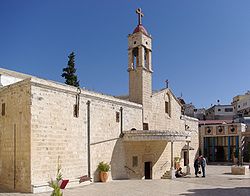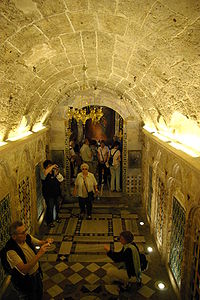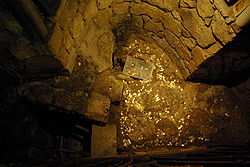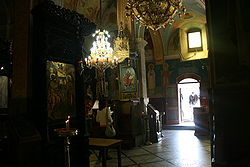- Greek Orthodox Church of the Annunciation
-
Greek Orthodox Church of the Annunciation The church
Basic information Location  Nazareth, Israel
Nazareth, IsraelGeographic coordinates 32°42′25.5″N 35°18′5.7″E / 32.707083°N 35.301583°ECoordinates: 32°42′25.5″N 35°18′5.7″E / 32.707083°N 35.301583°E Affiliation Eastern Orthodox Architectural description Direction of façade South Completed 1769 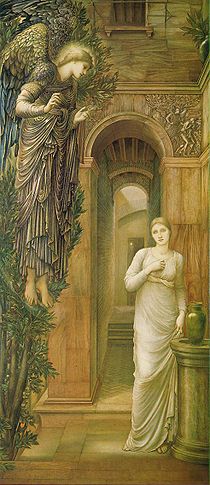 The Annunciation as depicted in an oil on canvas by Edward Burne-Jones (1879)
The Annunciation as depicted in an oil on canvas by Edward Burne-Jones (1879)
The Greek Orthodox Church of the Annunciation, also known as the Church of St. Gabriel or St. Gabriel's Greek Orthodox Church, is an Eastern Orthodox church in Nazareth, Israel. Likely first established in Byzantine-era Palestine, it was rebuilt during the time of the Crusades, and again in the 18th century under the rule of Daher el-Omar, the Arab governor of the Galilee.[1]
Known colloquially among the Arab citizens of Nazareth whom it serves as Keniset il-rum,[i] the church is located over an underground spring, which according to Eastern Orthodox belief is where the Virgin Mary was drawing water at the time of the Annunciation.[2][3] Water from the spring still runs inside the apse of the church and also fed the adjacent site of Mary's Well, located 150 yards (140 m) away.[1][4]
Contents
Biblical tradition
In Christian tradition, the event by which Mary was informed by the angel Gabriel of God's intention to make her the mother of Jesus is known as the Annunciation. In the New Testament of the Bible, in the Book of Luke (1:27-35), it is written that Gabriel was sent by God to Nazareth,
to a virgin betrothed to a man whose name was Joseph, of the house of David; and the virgin's name was Mary. And he came to her and said, "Hail, O favoured one, the Lord is with you!": But she was greatly troubled at the saying, and considered in her mind what sort of greeting this might be. And the angel said to her, "Do not be afraid, Mary, for you have found favor with God. And behold, you will conceive in your womb and bear a son, and you shall call his name Jesus.
He will be great, and be called the Son of the Most High;
and the Lord God will give to him the throne of his father David,
And he will reign over the house of Jacob forever;
And of his kingdom there will be no end."
And Mary said to the angel, "How shall this be, since I have no husband?" And the angel said to her,
"The Holy Spirit will come upon you,
and the power of the Most High will overshadow you;
therefore the child to be born will be called holy,
the Son of God."[1]While it mentions the town of Nazareth, the Book of Luke omits mention of details that might help to identify the precise location of this event therein. However, the Protoevangelium of James, a 2nd century apocryphal text, states that, "She took the jar and went out to fetch water. Then a voice spoke to her: 'Greetings, you who have received grace. The Lord is with you, you blessed among women.'"[1][5] The text continues to state that having looked around and seen no one, Mary returned home, placed the jar of water aside, and began to spin, whereupon the angel appeared before her to continue to inform of her appointed role.[1]
There are 18 churches of the Annunciation in Nazareth.[6] The Catholic Basilica of the Annunciation is located over the cave that is believed to have been Mary's home.[1] The Greek Orthodox Church of the Annunciiation is located over the spring where it is believed that Mary first heard the angel Gabriel's voice.[6] This spring, which is mentioned in the writings of pilgrims to Nazareth over the centuries, is also thought to be where the six-year old Jesus was sent by his mother to fetch water, as is recorded in the non-canonical Gospel of Thomas.[7]
History
The original church was likely constructed in the Byzantine era during the rule of Constantine I, at the site of a spring that was the village of Nazareth's only water supply.[8] Such natural sources of water were a vital part of every Palestinian village, and the spring in Nazareth served as its local watering hole for approximately three thousand years.[6][9]
The waters of the spring issue from a mountain known as Jabal as-Sikh and flow through an underground channel in the rock for 17 meters (56 ft) before emerging in the church. As recently as the 20th century, they continued on underground from there for another 130 meters to emerge in the public fountain known as Mary's Well.[7] Today's Mary's Well is a non-functioning reconstruction of the original that was built for Nazareth's millennium celebrations in 2000.
A church located above a spring in Nazareth is mentioned in the writings of Arculf, a monk from Gaul, in 670. Abbot Daniel, the Russian Orthodox Christian priest who travelled in the Holy Land, describes a church located at this site between 1106-1108 as follows:
"Then we left this town and went a little way to the north east where we found a wonderful well which was deep and very cold, and to reach the water you must go deep down on a stairway. And above this well there is a church dedicated to the Archangel Gabriel, and it is round."[7]
John Phocas, a Greek monk, writes in 1185 that in approaching Nazareth from the direction of Saffuriyya, "As soon as you enter the first gate of this large village, you will find a church of the Archangel Gabriel, and there is to be seen a little grotto on the left side of the altar in this church, in which a fountain wells up, pouring forth a transparent stream."[7] Burchard of Mount Sion, the German Dominican who travelled extensively in the Middle East, also describes the spring inside the church during his visit to Nazareth in 1283. He notes that it is venerated by the local people, it is from this spring that, "it is said that the Boy Jesus ... often used to draw water."[7]
In the 14th century writings of the Western traveller, James of Verona, the church is mentioned as being "two bow-shots away" from the (Catholic) Church of the Annunciation. James writes, "This was a decorous and beautiful chapel, but now is partly destroyed," and tells of drinking from the water of "a small clear spring" lying adjacent to the structure, which is said to be the same as that from which the Virgin Mary and Boy Jesus drank.[7] Another account from this century by the Franciscan friar Nicolas of Poggibonsi (c. 1346-50) describes a fine church of St. Gabriel as being held by "Indians of Persia, who are called Alaphisi". Denys Pringle explains that he may have meant Nestorians or Ethiopians, since he refers to these communities in other writings as Indiani.[7]
Accounts from the 16th century are contradictory. On the one hand, Boniface of Ragusa, an Italian priest who was in the region between 1551 and 1564, refers to people of "other nations" praying at the church. On the other hand, an account from 1563 by Luigi Vulcano della Padula describes the church as being in ruins, with only a small cave remaining as a memorial. At the end of the 16th century, Jan Kootwyk describes, "the ruins of an arched construction, of a certain sanctuary of the oriental Christians dedicated (it is said) to the Archangel Gabriel." Kootwyk also says that this structure was built on the foundations of the "House of Joseph".[7]
A 17th century account by Quaresmi, the Italian writer and Orientalist, indicates that the church was not visible above ground, but that the top of the vault of a subterranean chamber that had remained intact was at ground level. In 1626, he descended into this chamber which he described as follows:
"Its length is 24 palms [4.8 m], its width 14 [2.8 m] and its height or projection about 15 [3 m]. In the middle of it, to the east, is an altar for celebrating Mass. There are many pictures in it, but they are well-nigh destroyed by dampness, age, and the ill will of infidels. In the farthest part of the chapel is the mouth of a spring, from which its water are said to flow forth. And there is a stair, and at one time, a door by which one used to ascend to a convent of nuns, which, so as the tradition goes, used to be above it in times gone by [...] From time to time the Greeks hold services in it."[7]
During the rule of Daher al-Omar (1730–1775) over the Galilee, the local Greek Orthodox community obtained a firman granting them control over the church, which had been occupied previously by the Franciscans and the Greek Catholic.[7][10] Al-Omar granted this control to the local Arab Christian (or Palestinian Christian) community, rather than the Greek Orthodox Patriarchate of Jerusalem.[10] In 1750, they built a new church to the south side of the subterranean chamber, adding a wooden iconostasis (a screen decorated with icons) in 1767.[7] The church continues to be run by the Arab Orthodox local council in Nazareth today.[10]
Description
The church is located approximately 650 meters (2,130 ft) from the Basilica of the Annunciation and 130 meters (430 ft) from Mary's Well, which sits alongside the road leading to Saffuriyya. The underground chapel from the medieval era containing the spring is accessed from within the present church by descending seven steps.[7] Measuring 10 meters long, 3.3 meters wide, and 3.5 meters high, at the end of this low vaulted cavern, presumably built by the Crusaders in the 12th century, ancient Armenian tilework decorates the walls leading to a small recess.[11][12] There, below an altar with a semi-circular apse, a shaft leads down to the spring, and one can lower a metal cup to draw water.[11][12] On the wall to the east is doorway, whose entryway is blocked, and it thought that this is the stairway to which Quaresmi referred in his writings.[12]
Modern decorative murals cover the walls and the ceilings of the overground structure built in the 18th century. The iconostasis hides the altar from view, in keeping with Eastern Orthodox tradition. The tomb of the founder of the Church can be seen along the north wall.[11]
Gallery
Footnotes
- ^i Rum is the Arabic word for Romans, Byzantines and adherents of all nationalities of the Eastern Orthodox church.
References
- ^ a b c d e f Veselin Kesich and Lydia W. Kesich (1985). Treasures of the Holy Land: a visit to the places of Christian origins (Illustrated ed.). St Vladimir's Seminary Press. pp. 32–33.. ISBN 0881410454, 9780881410457. http://books.google.ca/books?id=usROogUUJrYC&pg=PA33&dq=james+nazareth+spring+mary&cd=8#v=onepage&q=james%20nazareth%20spring%20mary&f=false.
- ^ Chad Fife Emmett (1995). Beyond the Basilica:Christians and Muslims in Nazareth. University of Chicago Press. p. 81. ISBN 0226207110.
- ^ Frank J. Matera (2001). Strategies for Preaching Paul. Liturgical Press. p. 194. ISBN 0814619665. http://books.google.ca/books?id=hSU7opAFlOsC&pg=RA1-PA194&dq=%22greek+orthodox+church%22+nazareth&sig=gNDOWX4kSBkG2mKXxvR0qxMfa2A#PRA1-PA194,M1.
- ^ Paul L. Maier (1998). In the Fullness of Time: A Historian Looks at Christmas, Easter, and the Early Church. Kregel Publications. p. 84. ISBN 0825433290. http://books.google.ca/books?id=Hnb67CuoHugC&pg=PA84&dq=%22greek+orthodox+church%22+nazareth&lr=&as_brr=3&sig=hPHmgaZQHxj_ortO2CbfUFUFTdE#PPA84,M1.
- ^ "Church of St. Gabriel, Nazareth". Sacred Destinations. http://www.sacred-destinations.com/israel/nazareth-st-gabriel-orthodox-church.htm. Retrieved 2010-03-01.
- ^ a b c Robert A. Wallace, Gwynneth Wallace (2000). Pilgrim's Progress: A Spiritual Guide for the Holy Land Traveler. Westminster John Knox Press. p. 16. ISBN 0664501273. http://books.google.ca/books?id=VoJMEKSr7mkC&pg=PA16&dq=gabriel+nazareth+%22orthodox+church%22&lr=&as_brr=3&sig=qMX9YuV5It8vpwOeb2gyRgIyAS4#PPA16,M1.
- ^ a b c d e f g h i j k l Denys Pringle (1998). The Churches of the Crusader Kingdom of Jerusalem: L-Z (exluding Tyre) (Illustrated ed.). Cambridge University Press. pp. 140–143. ISBN 0521390370, 9780521390378. http://books.google.ca/books?id=2Y0tA0xLzwEC&pg=RA1-PA141&dq=%22church+of+the+annunciation%22+mary%27s+well+orthodox&lr=&cd=3#v=onepage&q=%22church%20of%20the%20annunciation%22%20mary%27s%20well%20orthodox&f=false.
- ^ LaMar C. Berrett (1996). Discovering the World of the Bible (3rd ed.). Cedar Fort. ISBN 0910523525, 9780910523523. http://books.google.ca/books?id=GzWS9al8ZUEC&pg=PA110&dq=%22greek+orthodox+church+of+the+annunciation%22&cd=2#v=onepage&q=%22greek%20orthodox%20church%20of%20the%20annunciation%22&f=false.
- ^ George A Barton (2009). Jesus of Nazareth; a Biography. BiblioBazaar, LLC. ISBN 1115169858, 9781115169851. http://books.google.ca/books?id=na0XrVa3KgsC&pg=PA74&dq=nazareth+spring+church+mary&cd=1#v=onepage&q=nazareth%20spring%20church%20mary&f=false.
- ^ a b c Emmett, 1995, p. 90.
- ^ a b c Norman Wareham, Jill Gill (1998). Every Pilgrim's Guide to the Holy Land. SCM-Canterbury Press Ltd. p. 173. ISBN 1853112127.
- ^ a b c Denys Pringle (1998). The Churches of the Crusader Kingdom of Jerusalem: L-Z (exluding Tyre) (Illustrated ed.). Cambridge University Press. pp. 141–143. ISBN 0521390370, 9780521390378. http://books.google.ca/books?id=2Y0tA0xLzwEC&pg=RA1-PA141&dq=%22church+of+the+annunciation%22+mary%27s+well+orthodox&lr=&cd=3#v=onepage&q=%22church%20of%20the%20annunciation%22%20mary%27s%20well%20orthodox&f=false.
Categories:- Arab Christians
- Churches in Nazareth
- Christianity in Israel
- Religious buildings completed in 1769
- 18th-century Eastern Orthodox church buildings
Wikimedia Foundation. 2010.

